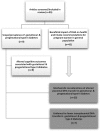Reduced DHA transfer in diabetic pregnancies: mechanistic basis and long-term neurodevelopmental implications
- PMID: 27142302
- PMCID: PMC4892301
- DOI: 10.1093/nutrit/nuw006
Reduced DHA transfer in diabetic pregnancies: mechanistic basis and long-term neurodevelopmental implications
Abstract
Infants born to diabetic mothers have a higher frequency of impaired neurodevelopment. The omega-3 or n-3 fatty acid docosahexaenoic acid (DHA) is an important structural component of neural tissue and is critical for fetal brain development. Maternal DHA supplementation during pregnancy is linked to better infant neurodevelopment; however, maternal-fetal transfer of DHA is reduced in women with diabetes. Evidence of mechanisms explaining altered maternal-fetal DHA transfer in this population is limited. This review explores existing evidence underpinning reduced maternal-fetal DHA transfer in maternal fuel metabolism in this population. Further research is necessary to evaluate the role of peroxisome proliferator-activated receptors in modulating placental fatty acid binding and maternal-fetal DHA transfer. Considerations for clinical practice include a diet high in DHA and/or provision of supplemental DHA to obstetric diabetic patients within minimum guidelines.
Keywords: PPAR; altered omega-3 transfer; diabetes; infant developmental outcomes; omega-3 fatty acids; pregestational type 2 diabetes..
© The Author(s) 2016. Published by Oxford University Press on behalf of the International Life Sciences Institute. All rights reserved. For Permissions, please e-mail: journals.permissions@oup.com.
Figures


Similar articles
-
Diabetic pregnancy, maternal and fetal docosahexaenoic acid: a review of existing evidence.J Matern Fetal Neonatal Med. 2018 May;31(10):1358-1363. doi: 10.1080/14767058.2017.1314460. Epub 2017 Apr 19. J Matern Fetal Neonatal Med. 2018. PMID: 28423959 Review.
-
Placental fatty acid transfer: a key factor in fetal growth.Ann Nutr Metab. 2014;64(3-4):247-53. doi: 10.1159/000365028. Epub 2014 Oct 2. Ann Nutr Metab. 2014. PMID: 25300267
-
Materno-fetal transfer of docosahexaenoic acid is impaired by gestational diabetes mellitus.Am J Physiol Endocrinol Metab. 2013 Oct 1;305(7):E826-33. doi: 10.1152/ajpendo.00291.2013. Epub 2013 Aug 6. Am J Physiol Endocrinol Metab. 2013. PMID: 23921142
-
Efficacy of docosahexaenoic acid-enriched formula to enhance maternal and fetal blood docosahexaenoic acid levels: Randomized double-blinded placebo-controlled trial of pregnant women with gestational diabetes mellitus.Clin Nutr. 2016 Jun;35(3):608-14. doi: 10.1016/j.clnu.2015.05.020. Epub 2015 Jun 9. Clin Nutr. 2016. PMID: 26091965 Clinical Trial.
-
Maternal Omega-3 Nutrition, Placental Transfer and Fetal Brain Development in Gestational Diabetes and Preeclampsia.Nutrients. 2019 May 18;11(5):1107. doi: 10.3390/nu11051107. Nutrients. 2019. PMID: 31109059 Free PMC article. Review.
Cited by
-
The association between maternal diabetes and the risk of attention deficit hyperactivity disorder in offspring: an updated systematic review and meta-analysis.Eur Child Adolesc Psychiatry. 2025 Jan 28. doi: 10.1007/s00787-025-02645-5. Online ahead of print. Eur Child Adolesc Psychiatry. 2025. PMID: 39873760
-
Metabolomic profiles and microbiota of GDM offspring: The key for future perspective?Front Pediatr. 2022 Oct 5;10:941800. doi: 10.3389/fped.2022.941800. eCollection 2022. Front Pediatr. 2022. PMID: 36275053 Free PMC article. Review.
-
Elevated Glucose and Insulin Levels Decrease DHA Transfer across Human Trophoblasts via SIRT1-Dependent Mechanism.Nutrients. 2020 Apr 30;12(5):1271. doi: 10.3390/nu12051271. Nutrients. 2020. PMID: 32365792 Free PMC article.
-
Embryonic fatty acid metabolism in diabetic pregnancy: the difference between embryoblasts and trophoblasts.Mol Hum Reprod. 2020 Nov 1;26(11):837-849. doi: 10.1093/molehr/gaaa063. Mol Hum Reprod. 2020. PMID: 32979266 Free PMC article.
-
Neurodevelopmental delay: Case definition & guidelines for data collection, analysis, and presentation of immunization safety data.Vaccine. 2019 Dec 10;37(52):7623-7641. doi: 10.1016/j.vaccine.2019.05.027. Vaccine. 2019. PMID: 31783983 Free PMC article. Review. No abstract available.
References
-
- Lawrence JM. Women with diabetes in pregnancy: different perceptions and expectations. Best Pract Res Clin Obstet Gynaecol. 2011;25:15–24. - PubMed
-
- Balsells M, Garcia-Patterson A, Gich I, et al. Maternal and fetal outcome in women with type 2 versus type 1 diabetes mellitus: a systematic review and metaanalysis. J Clin Endocrinol Metab. 2009;94:4284–4291. - PubMed
-
- Hod M, Levy-Shiff R, Lerman M, et al. Developmental outcome of offspring of pregestational diabetic mothers. J Pediatr Endocrinol Metab. 1999;12:867–872. - PubMed
-
- Levy-Shiff R, Lerman M, Har-Even D, et al. Maternal adjustment and infant outcome in medically defined high-risk pregnancy. Dev Psychol. 2002;38:93–103. - PubMed
Publication types
MeSH terms
Substances
LinkOut - more resources
Full Text Sources
Other Literature Sources
Medical

